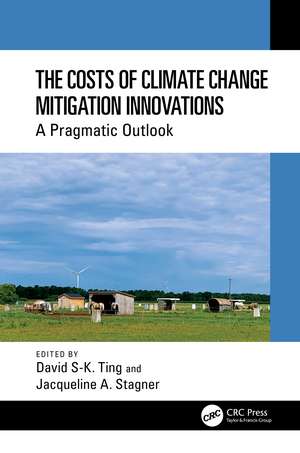The Costs of Climate Change Mitigation Innovations: A Pragmatic Outlook
Editat de David S-K. Ting, Jacqueline A. Stagneren Limba Engleză Hardback – 18 apr 2024
Preț: 592.49 lei
Preț vechi: 697.05 lei
-15% Nou
Puncte Express: 889
Preț estimativ în valută:
113.37€ • 118.38$ • 93.62£
113.37€ • 118.38$ • 93.62£
Carte tipărită la comandă
Livrare economică 15-29 aprilie
Preluare comenzi: 021 569.72.76
Specificații
ISBN-13: 9781032516813
ISBN-10: 103251681X
Pagini: 268
Ilustrații: 214
Dimensiuni: 156 x 234 x 16 mm
Greutate: 0.65 kg
Ediția:1
Editura: CRC Press
Colecția CRC Press
ISBN-10: 103251681X
Pagini: 268
Ilustrații: 214
Dimensiuni: 156 x 234 x 16 mm
Greutate: 0.65 kg
Ediția:1
Editura: CRC Press
Colecția CRC Press
Public țintă
Professional ReferenceCuprins
Chapter 1 The Pros and Cons of Climate Change Mitigation Innovations. Chapter 2 Investigating the R&D and Innovation Economic Efficiencies of the Renewable Energy Sectors in EU. Chapter 3 BIM‑Powered Energy Efficiency and Life‑Cycle Cost Analyses for Greener Design. Chapter 4 Improving Energy Efficiency of Tall Buildings Using Innovative Environmental Systems. Chapter 5 Efficiency of Space Utilization in Supertall Towers with Free Forms. Chapter 6 Linking between Renewables Development and Energy Security: A Scoping Review. Chapter 7 Energy Policy: Formulation, Monitoring, and Adaptation for Moving Towards a Low Carbon Economy. Chapter 8 Recent Developments in Large‑Scale Solar Flat Plate Reflecting Systems: Optical Analysis Using Specialized Numerical and Analytical Tools. Chapter 9 Energy Poverty and the Sustainable Development of Renewable Energy Systems. Chapter 10 The Challenges of Stakeholder Engagement in Climate Change Adaptation in Nigeria.
Notă biografică
David S-K. Ting studied Combustion and Turbulence, followed by Convection Heat Transfer and Fluid-Structure Interactions, prior to joining the University of Windsor. Dr. Ting is the founder of the Turbulence and Energy Laboratory and a professor in the Department of Mechanical, Automotive and Materials Engineering. Professor Ting supervises students on a wide range of research topics including Energy Conservation and Renewable Energy. To date, he has co-supervised over 90 graduate students, co-authored more than 170 journal papers, authored five textbooks, and co-edited more than 25 volumes.
Jacqueline A. Stagner is the Undergraduate Programs Coordinator in the Faculty of Engineering at the University of Windsor, and an adjunct faculty member in the Department of Mechanical, Automotive and Materials Engineering. Dr. Stagner co-advises students primarily in sustainable energy in the Turbulence and Energy Laboratory. Prior to working at the University of Windsor, she attained a PhD in Materials Science and Engineering, a Master of Business Administration, and a bachelor’s degree in Mechanical Engineering. She also worked as a release engineer in the automotive industry for six years. She has co-edited ten volumes.
Jacqueline A. Stagner is the Undergraduate Programs Coordinator in the Faculty of Engineering at the University of Windsor, and an adjunct faculty member in the Department of Mechanical, Automotive and Materials Engineering. Dr. Stagner co-advises students primarily in sustainable energy in the Turbulence and Energy Laboratory. Prior to working at the University of Windsor, she attained a PhD in Materials Science and Engineering, a Master of Business Administration, and a bachelor’s degree in Mechanical Engineering. She also worked as a release engineer in the automotive industry for six years. She has co-edited ten volumes.
Descriere
The notion that humanity may be too late to alter climate change could potentially lead to fear and therefore the advocacy of implementing radical strategies and/or hastening the execution of certain measures to the extreme. The bottom line is that we do not want todays’ solutions to become tomorrow’s problems.
